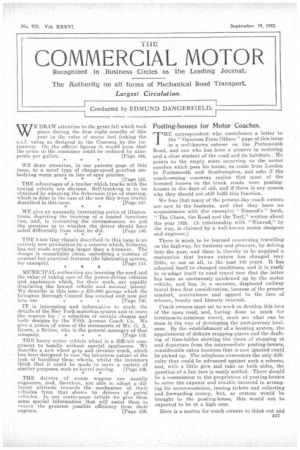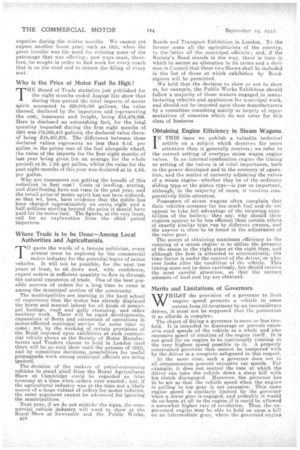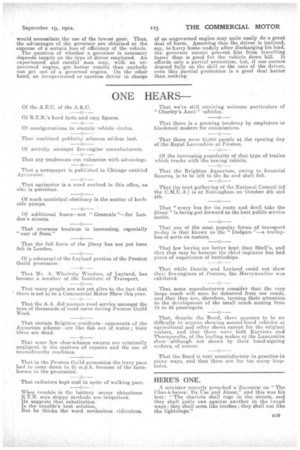Posting - houses for Motor Coaches.
Page 1

Page 2

Page 3

If you've noticed an error in this article please click here to report it so we can fix it.
THE correspondent who contributes a letter to the " Opinions From Others " page of this issue is a well-known caterer on the Portsmouth Road, and one who has been a pioneer in motoring and a close student of the road and its habitues. He points to the empty seats occurring on the motor coaches which pass his house, en-route from London to Portsmouth and Southampton, and asks if the coach-owning concerns realize that most of the licensed houses on the trunk roads were postinghouses in the days of old, and if there is any reason why they should not still fulfil this function.
We fear that many of the present-day coach owners are new to the business, and that they have no acquaintance with (for example) " Nimrod's " book, "The Chace, the Road and the Turf," written about the year 1828. (A relationship with "Nimrod," by the way, is claimed by a well-known motor designer and engineer.) .
There is much to be learned concerning travelling on the highway, for business and pleasure, by delving into the past, and there is thereby to be acquired a realization that human nature has changed very little, or not at all, in the past 100 years. It has adapted itself to changed conditions, and it is ready to re-adapt itself to road travel now that the latter has been so enormously quickened up by the motor vehicle, and has, in a measure, displaced railway travel from first consideration, because of the greater comfort, convenience and appeal to the love of science, beauty and historic interest.
Coach owners must set to work to develop this love of the open .road, and, having done so much for terminus-to-terminus travel, must see what can he done in the way of developing the part-journey business. By the establishment of.a booking system, the appointment of definite stopping-places and the drafting of time-tables showing the times of stopping at and departure from the intermediate posting-houses, considerable extra business that is now ignored could be picked up. The telephone overcomes the only difficulty that could be advanced against such a scheme, and, with a little give and take on both sides, the question of a fair fare is easily settled. There should be a commission to the proprietors of posting-houies to cover the expense and trouble incurred in arranging for accommodation, issuing tickets and collecting and forwarding money, but, as custom would be brought to the posting-house, this would not be expected to be at a high rate. , Here is a matter for coach owners to think out and organize during the winter months We cannot yet expect another boom year, such as 1921, when the great trouble was the need for refusing some of the patronage that was offering ; new ways must, therefore, be sought in order to find work for every coach that is on the road and to ensure the filling of every seat.
Why is the Price of Motor Fuel So High ?
THE Board of Trade statistics just published for the eight months ended Aug-uet 31st show that during that period the total imports of motor spirit amounted to 229,019,088 gallons, the value thereof, declared by the importers and representing the cost, insurance and freight, being £15,476,229. Here is disclosed an astonishing fact, for the total quantity imported during the first eight months of 1921 was 175,003,413 gallons, the declared value thereof being £18,457,276. The difference between these declared values represents no less than Lid. per gallon in the prime cost of the, fuel alongside wharf, the value of the imports for the first eight months of last year being given (on an average for the whole period) at 2s. 1, 3d. per gallon, whilst the value for the past eight months of this year was declared at is. 4.2d. per gallon.
Why are consumers not getting the benefit of this reduction in first cost? Costs of landing, storing, and distributing have not risen in the past year, and the retail price of motor spirit has not been reduced, so that we, here, have evidence that the public has been charged approximately an extra eight and a half millions sterling beyond the price it should have paid for its' motor fuel. The figures, at the very least, call for an explanation from the chief petrol importers.
Where Trade is to be Done—Among Local Authorities and Agriculturists. Where Trade is to be Done—Among Local Authorities and Agriculturists. TO quote the words of a famous politician, every avenue must be explored by the commercial motor industry for the potential buyer of motor vehicles. It will not be possible, for the next ten years at least, to sit down and, with confidence, expect orders in sufficient quantity to flow in through the natural expansion of trade. One of the best possible sources of orders for a long time to come is among the municipal section of the community.
The municipalities are learning in the hard school of experience that the motor has already displaced the horse and manual labour for all kinds of. municipal haulage, road and gully cleansing, and other sanitary work. There will be rapid developments, expansions of fleets and extensions of operations in motor-effected municipal service for some time to come; yet, by the working of certain provisions of the Bond imposed upon exhibitors at such commercial vehicle shows as the Society of Motor Manufacturers and Traders choose to hold in London (and there will be no such show until the autumn of 1923), and by committee decisions, possibilities for useful propaganda work among municipal officials are being ignored.
The decision of the makers of petrol-consuming vehicles to stand aloof from the Royal Agricultural Show at Cambridge could be regarded as false economy at a time when orders were wanted ; but, if the agricultural industry was at the time not a likely source of a large volume of orders for motor vehicles, the same argument cannot be advanced for ignoring the municipalities.
Next year, if we do not mistake the -signs, the commercial vehicle industry will vent to show at the Royal Show at Newcastle and the Public Works,
Roads and Transport Exhibition in London. To the former come all the agrieulturists of the country, to the latter all the municipal officials ; end, if the Society's Bond stands in the way, there is time in which to secure an alteration in its terms and a decision in Council that these two Shows shall be included in the list of those at which exhibition by Bondsigners will be permitted.
We hold that the decision to show or not .to show at, for example, the Public Work e Exhibition should follow a majority of those makers engaged in manufacturing vehicles and appliances for municipal work, and should not be imposed upon those Manufacturers by a committee consisting mainly or largely of representatives of concerns which do not cater for this class of business.
Obtaining Engine Efficiency in Steam Wagons, IN THIS issue we publish a valuable technical article on a subject which deserves far more attention than it generally receives ; we refer to the correct setting of overtype steam wagon engine valves. In an internal-combustion engine the timing or setting of the valves is of vital importance, both to the power developed and to the economy of operation, and the matter of correctly adjusting the valves of a steam engine—whether they be of the ordinary sliding type or the piston type—is just as important, although, in the majority of eases, it eeceives comparatively little attention.
Possessors of steam wagons often complain that their vehicles consume far too much fuel and do not appear to take full advantage of the steaming capabilities of the boilers ; they say, why should their engines appear to be less efficient than certain others of exactly similar type run by different owners, and the answer is often to be found in the adjustment of the valve gear. .
The secret of obtaining maximum efficiency in the running of a steam engine is to utilize the pressure of the steam in the right place at the right time, and although the first is attended to automatically, the time factor is under the control of the driver, or whoever looks after the condition of the vehicle. This timing must not be done carelessly, but should receive the most careful attention, so that the correcn amounts of lead and lap are obtained.
Merits and Limitations of Governors.
HURST the provision of a governor to limit engine speed protects a vehicle to some extent from ill-treatment by an inconsiderate driver, it must not be supposed that the protection it so affords is complete.
The object of fitting a governor is more or less twofold. It is intended to discourage or prevent excessive road speeds of the vehicle as a, whole and also excessive speed of rotation of the engine itself.. It is not good for an engine to be continually running at the very highest speed possible to it-. A properly constructed governor that cannot be tampered with by the driver is a complete safeguard in this respect.. At the same time, such a governor does not in all circumstances prevent excessive car speeds. For examples it does not control the rate at which the driver can take the vehicle down a steep hill with his clutch disengaged. Moreover, the governor hae to be set so that the vehicle speed when the engine is pulling in top gear is not excessive. This same engine speed is similarly limited by the governor when a lower gear is engaged, and probably it would do no harm at all to the engine if it could be allowed a somewhat higher rate of revolution. Thus, the ungoverned engine may be able to hold on upon a hill ou an intermediate gear, where the governed engine would necessitate the use of the lowest gear. Thus, the advantages of the governor are obtained at the expense of a certain loss of efficiency of the vehicle.
The question of whether a governor is necessary depends largely on the type of driver employed. An experienced and careful man may, with an ungoverned engine, get better results than anybody can get out of a governed engine. On the other hand, an inexperienced or careless driver in charge of an ungoverned engine may quite easily do a great deal of harm. Assuming that the driver is inclined, say, to hurry home unduly after discharging his load, the governor cannot prevent him from travelling faster than is good for the -vehicle down hill. It affords only a partial protection, but, if one cannot depend fully on the skill or the care of the driver, even this partial protection is a good deal better than nothing.






























